Entry-Level Publishing Assistant Cover Letter
Subject: Application for Publishing Assistant Position
Dear Hiring Manager,
I am writing to express my enthusiasm for the Publishing Assistant position at [Company Name]. As a recent graduate with a degree in English Literature and a passion for bringing compelling stories to readers, I am eager to contribute to your editorial team.
During my internship at [Previous Company], I gained hands-on experience in manuscript evaluation, copyediting, and coordinating with authors and designers. I assisted in the publication of twelve titles, managing timelines and ensuring quality standards were met throughout the production process.
What excites me most about [Company Name] is your commitment to diverse voices and innovative storytelling. Your recent publication of [specific title] particularly resonated with me, and I would be honored to support similar projects that push creative boundaries.
I am proficient in Adobe InDesign, Microsoft Office Suite, and various project management tools. My attention to detail, combined with my ability to manage multiple deadlines simultaneously, makes me well-suited for the fast-paced publishing environment.
I would welcome the opportunity to discuss how my skills and enthusiasm can contribute to your team's success. Thank you for considering my application.
Sincerely,
[Your Name]
[Phone Number]
[Email Address]
Experienced Editor Career Transition Letter
Subject: Senior Editor Application - Transitioning from Academic to Trade Publishing
Dear [Hiring Manager's Name],
After eight successful years as Managing Editor at [Academic Press], I am seeking to transition my expertise to trade publishing, specifically within [Company Name]'s fiction division.
My career has been defined by transforming complex manuscripts into accessible, engaging publications. At [Current Company], I oversee a team of six editors, manage annual budgets exceeding $2M, and have shepherded over 150 titles from acquisition through final production. My editorial decisions have resulted in three award-winning publications and a 40% increase in our division's market share.
While academic publishing has been rewarding, I am drawn to trade publishing's broader creative scope and reader engagement. Your house's reputation for literary excellence, combined with your innovative approach to digital integration, aligns perfectly with where I envision taking my career.
I bring strong relationships with literary agents, deep knowledge of editorial workflows, expertise in both print and digital formats, and a proven track record of mentoring junior staff. My transition represents not a departure from my strengths, but an evolution that will benefit your editorial vision.
I would appreciate the opportunity to discuss how my experience can translate into immediate value for your team.
Best regards,
[Your Name]
[LinkedIn Profile]
[Contact Information]
Printing Production Manager Application Letter
Subject: Application for Production Manager - Commercial Printing Division
Dear [Hiring Manager's Name],
I am applying for the Production Manager position at [Printing Company]. With twelve years of experience managing high-volume commercial printing operations, I have consistently delivered quality results while optimizing efficiency and reducing waste.
In my current role at [Current Company], I manage a 24/7 production floor with 45 staff members across three shifts. Key achievements include implementing a lean manufacturing system that reduced material waste by 28%, decreasing turnaround times by 35%, and maintaining a 99.2% on-time delivery rate over the past three years.
My technical expertise spans offset lithography, digital printing, large format production, and finishing operations. I am Six Sigma certified and have extensive experience with workflow automation software including Heidelberg Prinect and EFI Pace.
What distinguishes my approach is my commitment to both quality control and team development. I have successfully trained over 30 press operators and have maintained employee retention rates 40% above industry average through mentorship programs and safety initiatives.
[Company Name]'s investment in cutting-edge equipment and sustainability practices aligns with my professional values. I am confident that my operational expertise and leadership capabilities would make an immediate positive impact on your production goals.
I look forward to discussing how I can contribute to your continued success.
Respectfully,
[Your Name]
[Phone Number]
[Email Address]
Freelance Copyeditor Introduction Email
Subject: Professional Copyediting Services for Your Publishing House
Dear [Editor's Name],
I hope this message finds you well. I am a professional copyeditor specializing in fiction and creative nonfiction, and I am reaching out to introduce my services to [Publishing House Name].
With over six years of freelance experience, I have edited more than 200 manuscripts across various genres, including literary fiction, memoir, and young adult novels. My clients have included both independent authors and mid-sized publishing houses, and several titles I've worked on have received critical acclaim and industry awards.
My editing approach balances technical precision with respect for authorial voice. I am well-versed in Chicago Manual of Style, AP Style, and house style guides, and I work efficiently in Microsoft Word with Track Changes, Google Docs, and various editorial management systems.
I understand the seasonal demands of publishing schedules and can accommodate both rush projects and long-term partnerships. My rates are competitive, and I offer flexible arrangements for ongoing collaborations.
I would be delighted to provide references, sample edits, or discuss how my services might complement your editorial workflow. Please feel free to contact me at your convenience.
Thank you for your consideration.
Warm regards,
[Your Name]
[Website]
[Email Address]
[Phone Number]
Print Sales Representative Cover Letter
Subject: Application for Commercial Print Sales Representative
Dear [Hiring Manager's Name],
Your advertisement for a Commercial Print Sales Representative immediately caught my attention, as it perfectly aligns with my background in B2B sales and my passion for the print industry.
For the past five years, I have consistently exceeded sales targets at [Current Company], a regional printing services provider. My achievements include growing my territory revenue by 180% through strategic account development, securing fifteen new corporate accounts with annual contracts exceeding $50K each, and maintaining a 92% client retention rate through exceptional relationship management.
I understand that successful print sales requires both technical knowledge and consultative selling skills. I have educated myself extensively on printing processes, substrates, finishing options, and cost variables, enabling me to provide genuine solutions rather than simply taking orders.
What excites me about [Company Name] is your reputation for innovation and your investment in advanced printing technologies. I am particularly impressed by your sustainable printing initiatives and believe these differentiators provide excellent talking points for prospective clients.
My approach combines persistence with professionalism. I am comfortable with cold calling, networking events, and leveraging digital marketing tools to generate leads. I am also committed to understanding client needs deeply and building long-term partnerships.
I would welcome the opportunity to discuss how my proven sales record can contribute to your growth objectives.
Sincerely,
[Your Name]
[Contact Information]
Literary Agent Query Cover Letter
Subject: Aspiring Literary Agent - Application
Dear [Agency Principal's Name],
I am writing to express my strong interest in joining [Agency Name] as a literary agent. Having followed your agency's remarkable success in representing both emerging and established voices, I am inspired by your commitment to championing diverse storytelling.
My background uniquely positions me for this role. I hold an MFA in Creative Writing and have spent four years as an acquisitions editor at [Publishing House], where I acquired and edited twenty-three titles across literary fiction and narrative nonfiction. This experience has honed my ability to identify marketable manuscripts and understand the commercial publishing landscape.
Beyond editorial skills, I bring strong business acumen and relationship-building capabilities. I have cultivated extensive connections within the publishing community, including editors at major houses, marketing professionals, and fellow agents. I am comfortable negotiating contracts and advocating fiercely for authors' interests.
My editorial sensibility gravitates toward literary fiction with commercial appeal, particularly stories featuring underrepresented perspectives and innovative narrative structures. However, I am also drawn to memoir and cultural criticism that challenges conventional thinking.
I am deeply committed to the agent-author partnership model, understanding that my role extends beyond selling manuscripts to career stewardship and creative advocacy. I would be honored to contribute to [Agency Name]'s continued success and help shape the next generation of important literary voices.
Thank you for considering my application. I would welcome the opportunity to discuss my qualifications further.
Best regards,
[Your Name]
[Phone Number]
[Email Address]
Career Change to Publishing Email
Subject: Transitioning from Marketing to Publishing - Editorial Coordinator Position
Hi [Hiring Manager's Name],
I'm reaching out about the Editorial Coordinator opening at [Publishing House]. While my resume shows a marketing background, my passion has always been books, and I'm ready to make the leap into publishing.
For the past five years, I've worked in digital marketing at [Tech Company], managing content strategy and overseeing creative projects from concept to completion. This role has taught me project management, deadline juggling, and cross-functional collaboration—skills that translate directly to editorial coordination.
Here's what makes me serious about this transition: I'm an active member of two book clubs, I've completed online courses in copyediting and publishing through Columbia University, I volunteer as a beta reader for three independent authors, and I've started a book review blog that's attracted over 5,000 monthly readers.
I understand I'm not the conventional candidate, but my fresh perspective and transferable skills could bring real value to your team. My marketing background means I think about audience and marketability instinctively, which could complement your editorial process.
I'm hardworking, genuinely obsessed with books, and eager to learn from experienced publishing professionals. If you're willing to take a chance on someone with unconventional credentials but authentic passion, I promise you won't regret it.
Would you be open to a conversation about how my unique background might benefit your team?
Thanks for considering,
[Your Name]
[Email Address]
[Phone Number]
Why Do You Need a Cover Letter for Publishing and Printing Jobs
- Cover letters allow you to demonstrate your genuine passion for books, storytelling, or print craftsmanship—qualities that resumes alone cannot convey
- The publishing and printing industries value communication skills, and a well-crafted cover letter serves as your first writing sample
- These fields are highly competitive with many qualified candidates, making personalized cover letters essential for standing out
- Hiring managers in publishing expect to see your understanding of their specific imprint, agency, or press's catalog and mission
- Cover letters provide space to explain career transitions, gaps in employment, or non-traditional paths into the industry
- They allow you to address specific requirements mentioned in job postings and demonstrate you've done your research
- In creative industries like publishing, your cover letter tone and style can showcase your editorial sensibility and cultural fit
When Should You Send a Cover Letter for Publishing and Printing Positions
- When applying for any advertised position in publishing houses, literary agencies, or printing companies
- When reaching out to introduce yourself as a freelance professional (editor, proofreader, designer, sales representative)
- After networking events or informational interviews to follow up and express continued interest
- When transitioning from related industries (journalism, education, marketing) into publishing or printing
- Before submitting your portfolio or manuscript samples to demonstrate professionalism
- When responding to internal job postings if seeking promotion or department transfer
- After being referred by a mutual connection or current employee
- When seeking internships or entry-level positions where enthusiasm matters as much as experience
- Upon learning about upcoming projects or expansions that might create new opportunities
Who Should Write Cover Letters for Publishing and Printing Jobs
- Recent graduates with degrees in English, Communications, Journalism, or Graphic Arts seeking entry into the industry
- Experienced editors, agents, or production managers looking to advance their careers or change companies
- Career changers from adjacent fields who want to leverage transferable skills
- Freelance professionals seeking to establish ongoing relationships with publishing houses or print shops
- Technical specialists (press operators, prepress technicians, bindery workers) applying for supervisory roles
- Sales and marketing professionals targeting publishing or commercial printing companies
- Creative professionals (designers, illustrators) seeking in-house positions
- Academic editors or journalists transitioning to trade publishing
- Print production managers moving between commercial, packaging, or publishing printing sectors
Elements and Structure of Publishing and Printing Cover Letters
- Subject line (for emails): Clearly state the position and your name for easy tracking
- Personalized greeting: Address the hiring manager by name whenever possible; research on LinkedIn or company websites
- Strong opening paragraph: Immediately state which position you're applying for and capture attention with relevant credentials or connections
- Body paragraphs demonstrating qualifications: Provide 2-3 specific examples of relevant experience, achievements, or skills
- Company knowledge paragraph: Show you understand the organization's mission, recent publications, or market position
- Technical skills section: Mention relevant software (InDesign, Prinect, editorial management systems) and industry certifications
- Passion statement: Express genuine enthusiasm for books, storytelling, or print craftsmanship
- Call to action: Request an interview or conversation and thank them for consideration
- Professional signature: Include full contact information and relevant links (portfolio, LinkedIn, professional website)
- Attachments reference: Mention your resume, portfolio samples, or references are included
How to Write an Effective Cover Letter for Publishing and Printing Positions
- Begin by thoroughly researching the company, recent publications, awards, or notable projects they've completed
- Review the job description carefully and identify the top 3-5 qualifications they're seeking
- Draft an opening that immediately establishes your relevant credentials and interest in that specific organization
- Use concrete examples with measurable results (number of titles edited, percentage improvements in production efficiency)
- Match your tone to the company culture—more formal for academic presses, slightly creative for trade publishers
- Demonstrate industry knowledge by mentioning relevant software, processes, or terminology naturally
- Show rather than tell by providing brief anecdotes that illustrate your skills and work ethic
- Address any potential concerns proactively (career gaps, transitions, relocations)
- Edit ruthlessly for clarity, conciseness, and error-free writing—mistakes are especially damaging in publishing applications
- Request feedback from mentors or colleagues in the industry before sending
- Customize each letter significantly rather than using generic templates
- End with confidence and a clear next step
Requirements and Prerequisites Before Sending Your Cover Letter
- Obtain the correct name and title of the hiring manager through company websites, LinkedIn, or phone inquiries
- Verify the preferred application method (email, online portal, postal mail for some traditional publishers)
- Prepare a tailored resume that complements your cover letter content without excessive repetition
- Gather portfolio samples or work examples relevant to the specific position
- Compile a reference list with current contact information and prior permission from references
- Research the company's recent publications, awards, market position, and editorial philosophy
- Review your social media presence to ensure professionalism, especially LinkedIn and Twitter
- Prepare answers to likely interview questions in case your letter generates immediate interest
- Have all necessary documents in proper formats (PDF for most email applications)
- Check application deadlines and ensure you're submitting with adequate time
- Identify any connections or networking relationships with current employees you might mention
Formatting Guidelines for Publishing and Printing Cover Letters
- Length: Keep to one page or 300-400 words maximum; publishing professionals value conciseness
- Format: Use standard business letter format for postal mail; clean email format for digital submissions
- Font: Choose professional, readable fonts like Times New Roman, Garamond, or Arial in 11-12 point size
- Tone: Professional yet personable for most publishing roles; more formal for senior executive positions
- File naming: Use clear conventions like "LastName_FirstName_CoverLetter_Position.pdf"
- Paragraphs: Keep paragraphs short (3-5 sentences) for easy scanning
- Margins: Use standard one-inch margins on all sides
- Spacing: Single-space within paragraphs, double-space between paragraphs
- Bullets: Use sparingly and only for listing technical skills or brief achievements
- Attachments: Send as PDF unless specifically requested otherwise to preserve formatting
- Email etiquette: Include your cover letter in the email body AND attach it as a document
- Proofreading: Have zero typos or grammatical errors—this is non-negotiable in publishing
Common Mistakes to Avoid in Publishing and Printing Cover Letters
- Sending generic letters that don't reference the specific company or position
- Making typos or grammatical errors, which immediately disqualify candidates in editorial roles
- Focusing too much on what you want rather than what you offer the employer
- Using overly casual language or clichés like "I'm a people person" or "I think outside the box"
- Repeating your resume verbatim instead of expanding on key experiences
- Failing to demonstrate knowledge of the company's publications or printing specializations
- Writing excessively long letters that exceed one page
- Neglecting to mention relevant technical skills or software proficiencies
- Using inappropriate humor or overly creative formatting that seems unprofessional
- Addressing letters "To Whom It May Concern" when hiring manager names are findable
- Forgetting to update company names when using templates, creating embarrassing errors
- Exaggerating qualifications or making claims you cannot substantiate
- Including salary requirements unless specifically requested
- Using passive voice excessively instead of active, confident language
Tips and Best Practices for Publishing and Printing Cover Letters
- Lead with your strongest, most relevant credential or accomplishment in the opening sentence
- Name-drop appropriately by mentioning mutual connections, recent company publications you admired, or industry events where you met staff
- Use industry-specific terminology naturally to demonstrate insider knowledge (e.g., "acquisitions," "P&L statements," "press checks," "bluelines")
- Quantify achievements whenever possible with specific numbers, percentages, or metrics
- Show your reading habits or knowledge of the company's catalog to demonstrate genuine interest
- Mirror language from the job description to help with applicant tracking systems
- Include a brief story or anecdote that illustrates your passion or problem-solving abilities
- Research the hiring manager's professional background and find common ground to mention
- Follow up your application with a polite inquiry after 1-2 weeks if you haven't heard back
- Keep a spreadsheet tracking where and when you applied to manage follow-ups
- Prepare different versions for different types of roles (editorial vs. production vs. sales)
- Have someone in the industry review your letter before sending
After Sending Your Cover Letter: Follow-Up Actions
- Send a confirmation email if you mailed physical materials to ensure they arrived
- Add a calendar reminder to follow up after 10-14 business days if you haven't received a response
- Continue applying to other positions rather than waiting for one response
- Prepare for potential interviews by reviewing common questions and practicing answers
- Update your application tracking spreadsheet with submission dates and contact information
- Monitor your email and phone regularly for responses, checking spam folders daily
- Research the company more deeply in preparation for possible interviews
- Prepare questions to ask interviewers about the role, team culture, and growth opportunities
- Connect with the hiring manager on LinkedIn after a respectful waiting period (2-3 weeks)
- If rejected, send a gracious response thanking them and expressing interest in future opportunities
- Request informational interviews even if the specific position isn't available
- Keep refining your cover letter based on response rates and any feedback received
Comparing Publishing and Printing Cover Letters to Other Industry Applications
- Publishing vs. corporate cover letters: Publishing letters should emphasize passion for books and culture rather than purely business metrics
- Printing vs. general manufacturing: Print industry letters should highlight both technical expertise and quality consciousness over production volume alone
- Creative vs. production roles: Editorial/agent letters need more personality and reading knowledge; production/printing letters emphasize technical skills and efficiency
- Traditional vs. networking letters: Cold applications require more company research; referral letters can be slightly more conversational
- Entry-level vs. senior positions: Junior letters should emphasize enthusiasm and learning potential; senior letters must demonstrate leadership and strategic vision
- Freelance vs. staff positions: Freelance introductions focus on flexibility and portfolio; staff applications emphasize cultural fit and long-term commitment
- Email vs. postal mail: Digital applications allow slightly more casual tone; mailed letters should be more formally structured
- Publishing cover letters vs. query letters: Cover letters are about you; query letters pitch specific book projects
Pros and Cons of Sending Cover Letters for Publishing and Printing Jobs
Advantages:
- Demonstrates serious interest and professionalism that separates you from applicants who skip this step
- Provides opportunity to address career transitions or resume gaps proactively
- Allows you to showcase writing skills critical for publishing roles
- Gives space to explain why you're specifically interested in that company or imprint
- Creates a more personal connection with hiring managers before interviews
- Helps you stand out in competitive application pools with dozens of qualified candidates
Disadvantages:
- Time-consuming to customize properly for each application
- Risk of errors or misjudged tone that could hurt your chances
- Some companies may not read cover letters thoroughly, especially for high-volume positions
- Difficult to know appropriate length and level of detail without insider knowledge
- May reveal information (like salary history or location constraints) that could limit negotiations
- Can feel redundant if the application portal requires extensive form-filling about qualifications
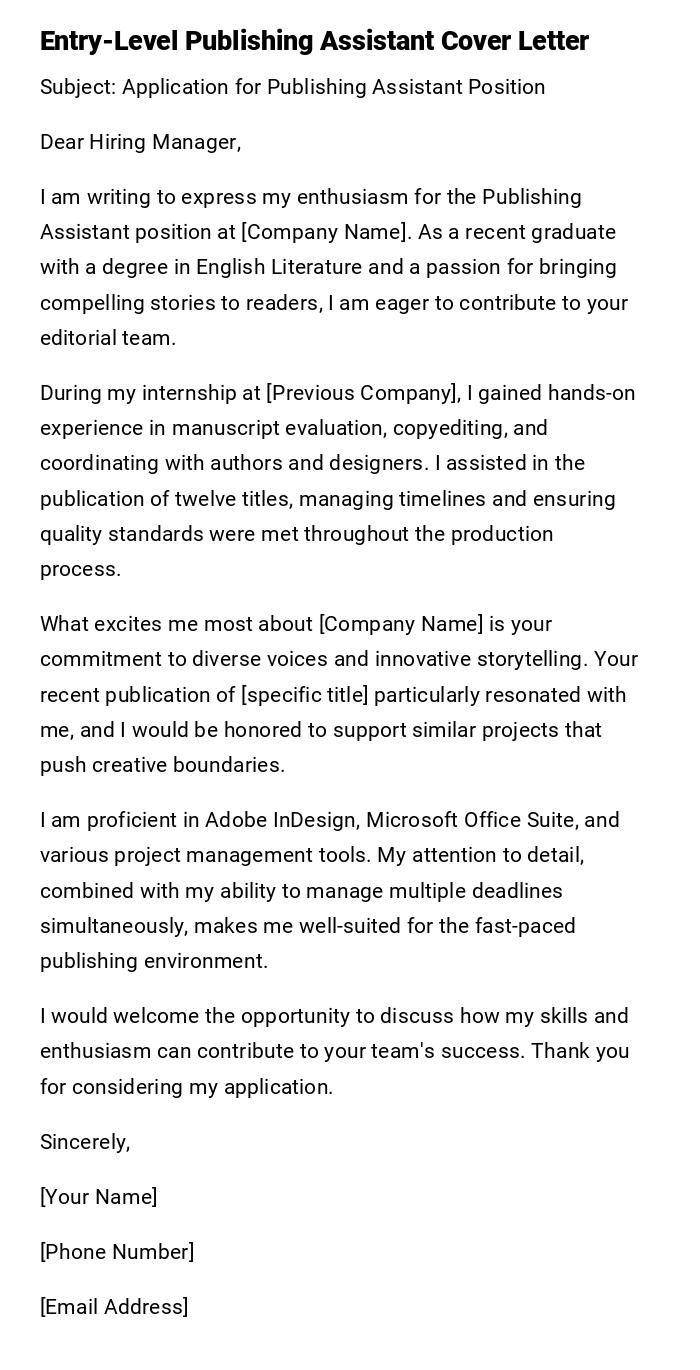
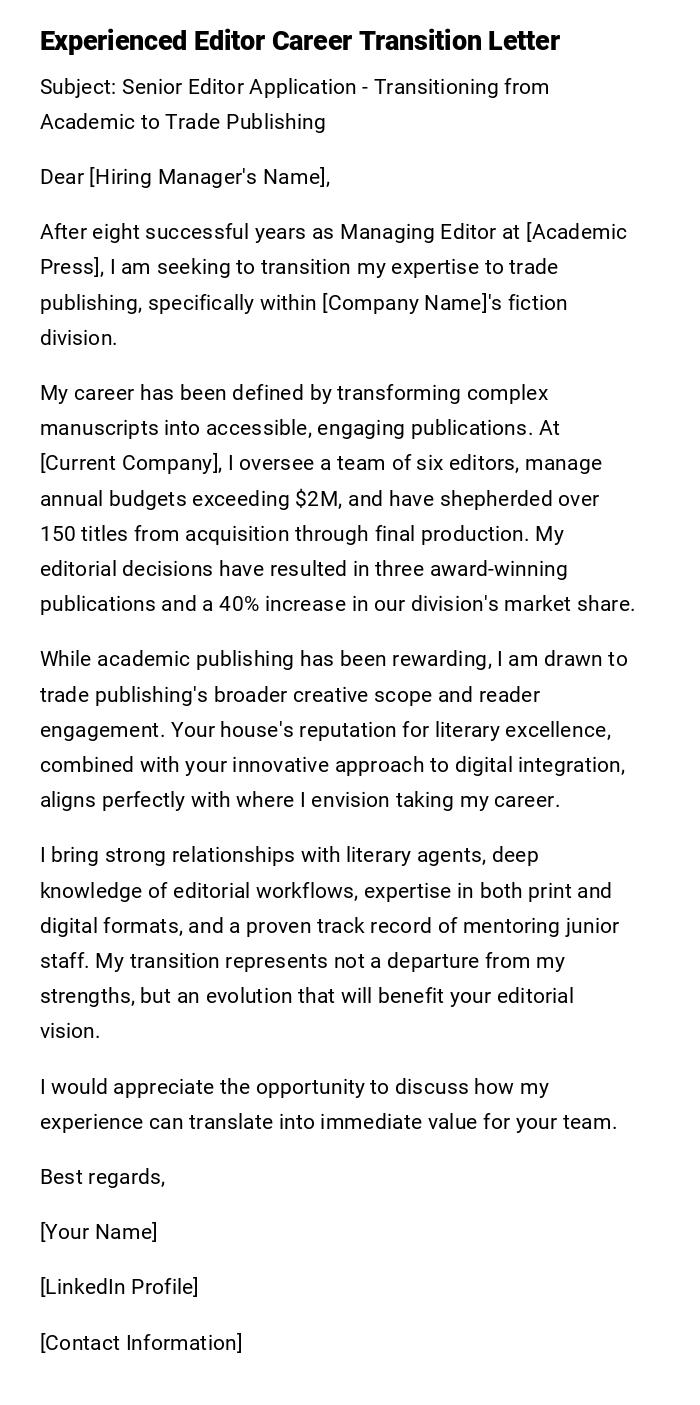
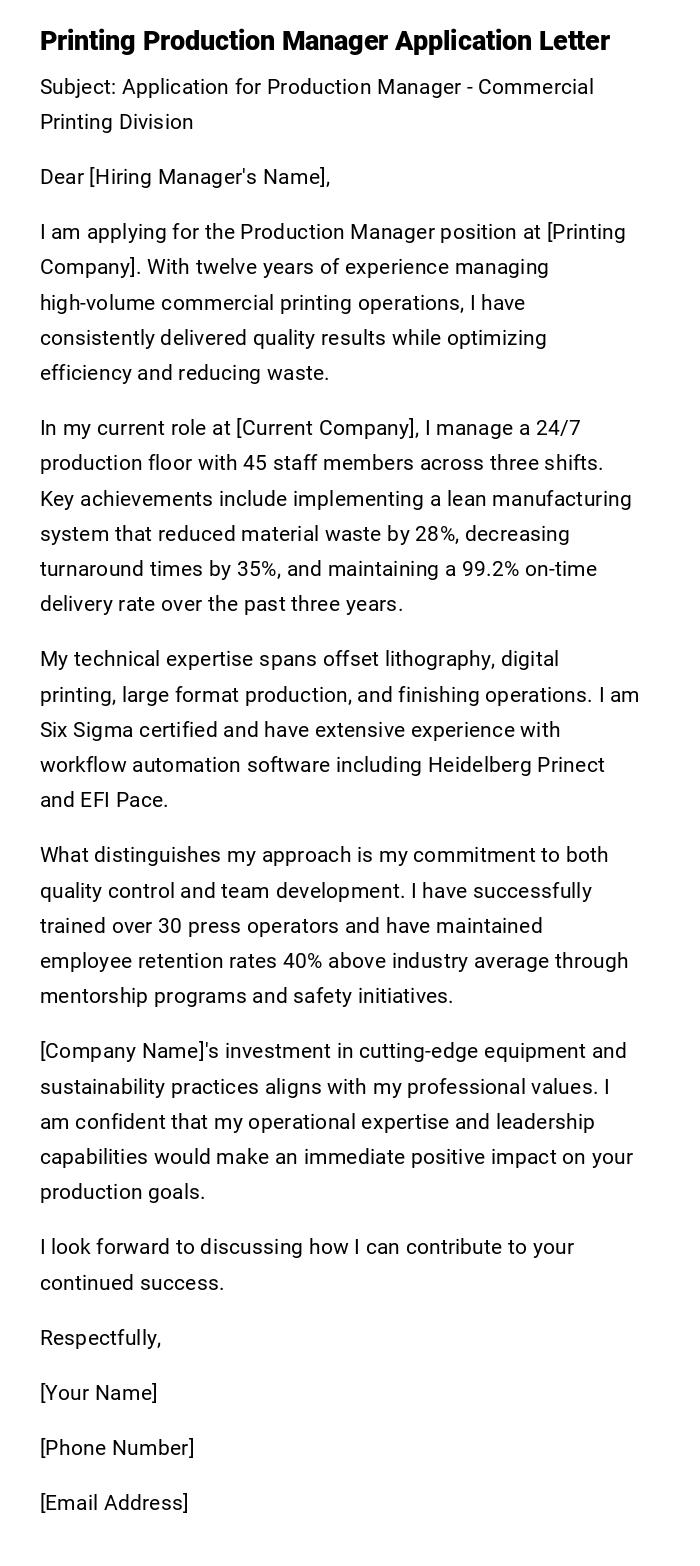
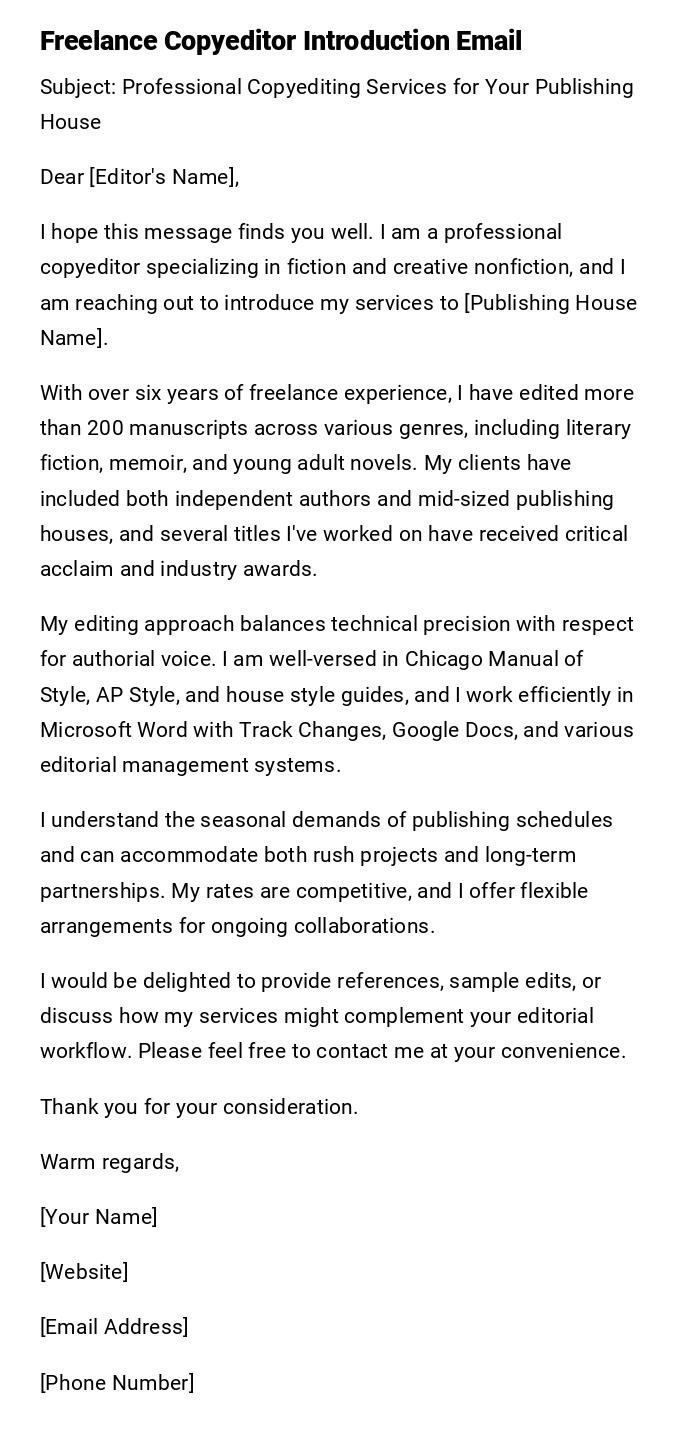
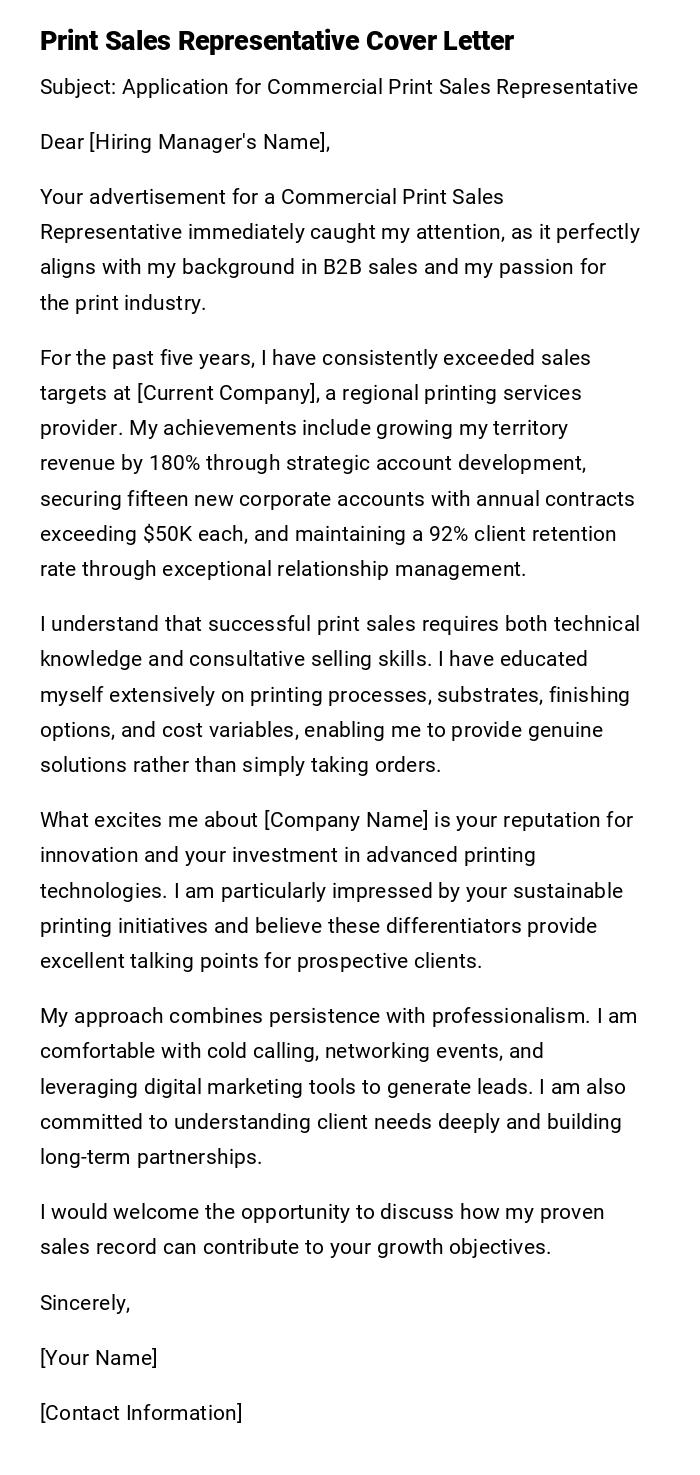
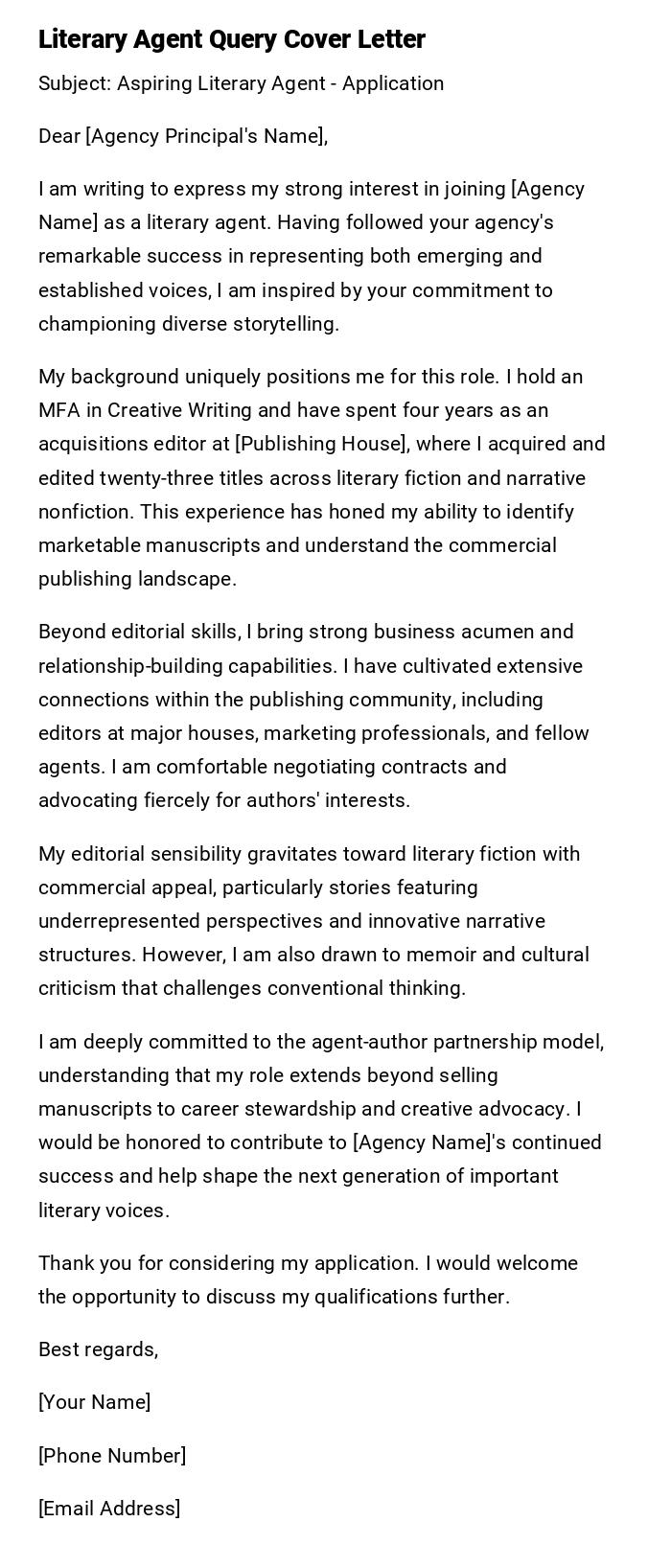
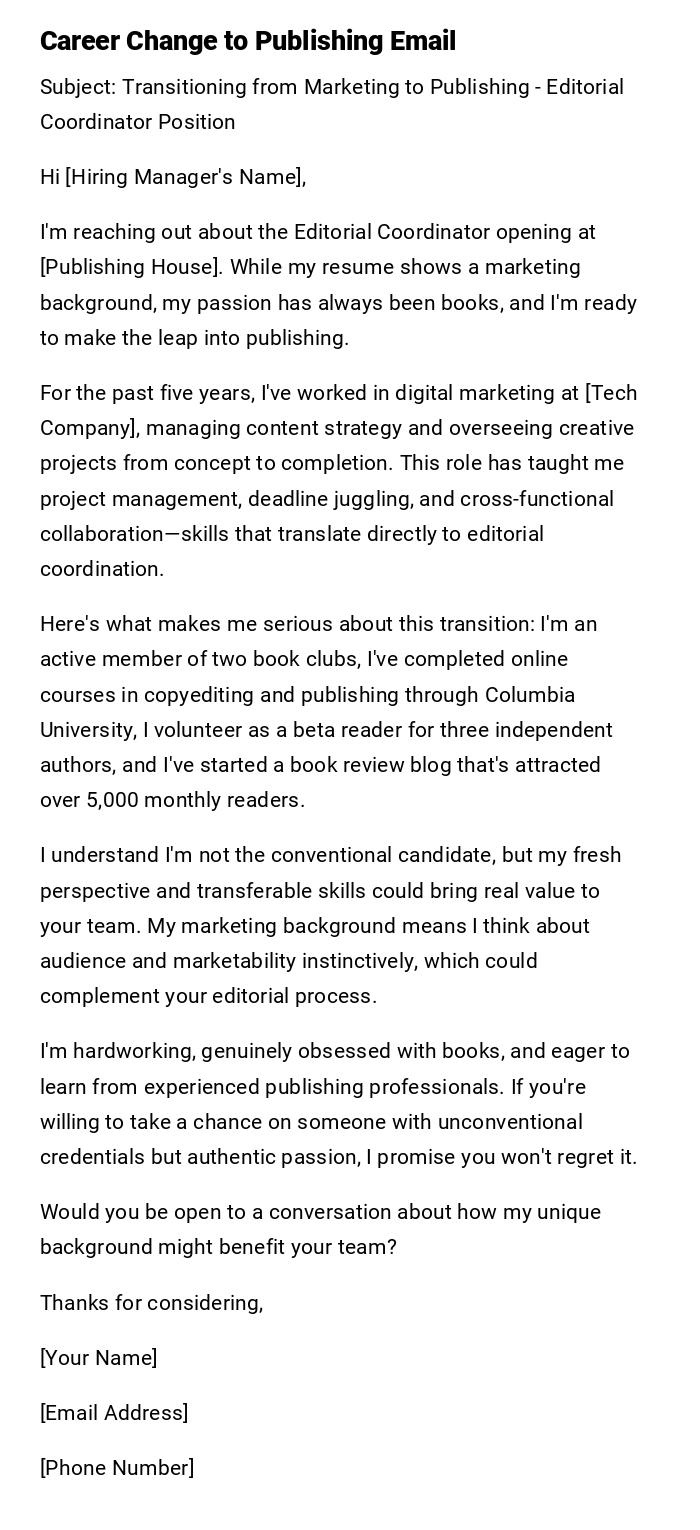

 Download Word Doc
Download Word Doc
 Download PDF
Download PDF